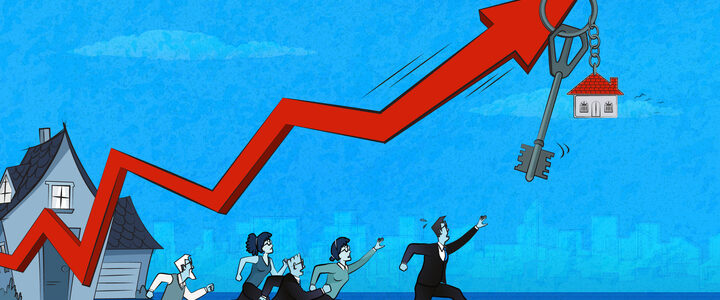Construction costs and real estate values have increased virtually in tandem since the start of the COVID-19 pandemic in March of 2020. As the pandemic eased in the middle of 2022 rapidly rising property values continued to dominate the real estate market, as well as the cost associated with building supplies. How do rising property costs affect insurance?
The answer is there is a direct link between the value of a commercial structure and the cost of insuring it with a comprehensive policy.
Historically low interest rates coupled with an acute commercial building shortage formed the perfect storm for the increase in property costs. The timeless law of supply and demand pushed property costs above what commercial property owners would typically pay for real estate. If you own a commercial structure, insuring it has likely never been more costly.
Although the Federal Reserve System recently hiked lending rates by 50 points, now is the time to decide whether you need to purchase more property insurance to stay abreast with the rapidly rising value of commercial real estate.
What Are the Factors That Determine Commercial Property Costs?
Why have rising property costs affected commercial property insurance? The answer is a combination of traditional economics theory with the one-in-a-lifetime influence of a pandemic.
Supply and Demand
The commercial real estate market is the ideal market to analyze the impact of classic supply and demand economics. A cold market develops when the supply of commercial properties exceeds the amount of demand. We currently are in a hot market, perhaps the hottest commercial real estate market of all time. Demand for commercial properties far exceeds a limited supply.
The reasons for the current hot market include commercial property owners hanging on to their properties because of the uncertain commercial real estate market spawned by the COVID-19 pandemic. Uncertainty is the most important motivating factor as to why commercial property owners hang on to their properties when initially, they wanted to sell.
Location, Location, Location
You hear plenty from commercial real estate brokers about the importance of location when it comes to starting a business. Customers want easy access to visit a commerical property and location plays a significant role in helping a property owner achieve optimal convenience. Safety and the potential for additional commercial development also matter when it comes to pricing the value of a property.
Size and Amenities
Size is an integral element in determining the value of a commercial property. Property costs increase in direct correlation to an increase in the size of a business.
The amenities that attract buyers also matter in calculating commercial property costs. Features such as skylights, underground parking spaces, and Energy Star-rated windows all contribute to determining commercial property costs. The more amenities you add, the higher the value of a commercial property, and hence, the higher the cost of insurance.
How to Lower the Cost of Commercial Insurance
Now that we know about the direct relationship between the value of commercial real estate and the cost of paying for insurance, let’s see how you can reduce the amount of money you spend each month to keep your business insured.
Increase the Annual Deductible
Regardless of the type of insurance, increasing the annual deductible represents an effective way to decrease monthly premiums. This is especially true for commercial property insurance, as the monthly premiums and annual deductible typically are higher for larger structures, such as commercial properties that span several floors.
Raising the annual deductible only works if you have enough money saved to pay for unexpected property damage that falls within the deductible limit, such as repairing the damage done by a severe thunderstorm or snowstorm.
Make Security a Priority
Insurance companies love businesses that invest in state-of-the-art security systems. Even the most simple security strategies, such as installing deadbolt locks, can help you save money on monthly insurance premiums. Commercial properties monitored by an advanced security camera system also can help lower the cost of commercial property insurance.
The Bottom Line
Your commercial property is the most valuable asset that you own. Making sure it is adequately insured represents the most important personal finance decision you can expect to make for your business. During an era of inflation when commercial property costs have increased substantially, it makes sound fiscal sense to purchase insurance that reflects the rise in commercial real estate prices. For this reason, we strongly encourage commercial property owners to speak with their independent insurance agent and ensure that their commercial property insurance has the coverages and limits needed to cover the property in the event of an unforeseen loss – particularly, if the limits of coverage have not been increased for some time.
There for You: Acadia Insurance
At Acadia, we’re all about helping businesses throughout the Northeast thrive. Our mission is to provide superior service and product as close to you as possible, providing you with the backing you need to proceed with confidence.
We understand what you want most from your insurance is security and peace of mind. That means knowing you are backed by an insurance company who will support you every step of the way to help you protect your business.
With Acadia, not only can you get coverage tailored to your needs, but you will also receive support from dedicated claims professionals to guide you through the claim process in the event of a loss. That way, you know exactly what to expect. Knowing your claims professional by name and a hand shake – that’s “Closer Coverage”. Get to know more about how we work and find an agent near you by going to the Find an Agent section on our public website (www.acadiainsurance.com).
Acadia is pleased to share this material for the benefit of its customers. Please note, however, that nothing herein should be construed as either legal advice or the provision of professional consulting services. This material is for informational purposes only, and while reasonable care has been utilized in compiling this information, no warranty or representation is made as to accuracy or completeness. Recipients of this material must utilize their own judgment in implementing sound risk management practices and procedures.




